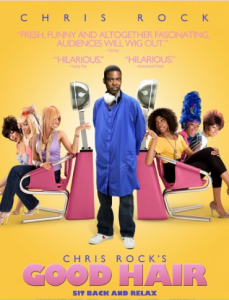 You gotta see “Good Hair.” It’s a great film for everyone, taking a humorously candid look at the politics of and price paid for beauty. A mix between Chris Rock’s cheeky stand-up and Michael Moore‘s tongue-in-cheek documentaries, you’ll be surprised by the facts presented around the national and global politics surrounding the billion dollar Black hair product industry.
You gotta see “Good Hair.” It’s a great film for everyone, taking a humorously candid look at the politics of and price paid for beauty. A mix between Chris Rock’s cheeky stand-up and Michael Moore‘s tongue-in-cheek documentaries, you’ll be surprised by the facts presented around the national and global politics surrounding the billion dollar Black hair product industry.
From who really owns most Black hair product businesses, to where hair for weaves comes from, to the cost of maintaining perfect looking locks. Below is a review of the film by my friend Olu over at Los Angeles Wave.
Shear Comedy in Chris Rock’s New Documentary
Los Angeles WAVE, News Feature, by Olu Alemoru
Whether natural or processed, free-flowing or covered with stylish headwear, no discussion of Black hair is just follicle-deep.
This is particularly true for Black women, who meticulously tend to their crowning glories in beauty establishments across the land, creating not just a multi-billion-dollar economy but a grooming ritual that has become a metaphor for life.
In the documentary “Good Hair,” comedian Chris Rock casts a critical and humorous eye on the Black hair-care business and explores the historical, political and social issues that play into the relationship between African-American women and their hair.
The film follows Rock as he journeys from New York to Atlanta, Dallas, Birmingham, Los Angeles and even India to find the finer points of the story. Along the way, he encounters hair-care professionals, beauty and barbershop patrons and celebrities including Raven Symoné, Ice-T, the Rev. Al Sharpton, Nia Long and Salt-N-Pepa, all of whom offer their hair-raising and candid perspectives.
The background to the film is rooted in Rock’s early stand-up career, and an out-of-the-mouth-of-babes moment when his then five-year-old daughter asked him why she doesn’t have “good hair.”
Like any doting dad, Rock laughed it off and told her for the umpteenth time that day just how beautiful she was. But the question struck a chord and a potential film idea was born.
Rock had always vividly recalled doing a stand-up gig in Atlanta during the annual Bonner Bros. Hair Show, an iconic event that has filled the city’s hotels for a half-century, but that the young comic was oblivious to.
Thus, teaming up with the creative team behind HBO’s “The Chris Rock Show,” including producer Nelson George, writers Lance Crouther and Chuck Sklar and writer/director Jeff Stilson, they set about weaving an interesting tale to tell.
Using the centerpiece of the Bonner Bros. show – the Hair Battle Royale Finale between top hair stylists – as a narrative, Rock frequently moves into investigative journalist mode to impart some fascinating facts and expose a healthy share of double-take moments.
One of the earliest in that regard is when Rock visits Dudley Products in Greensboro, North Carolina – one of the oldest African-American-owned hair product companies – to see how relaxer, whose key ingredient is sodium hydroxide, is made.
Cutting from the huge vats of white liquid, Rock then consults an expert chemist who uses soda cans to demonstrate the harmful effects of the solution. After 20 minutes, three-quarters of the can has been eroded, 40 minutes later half the can has been eaten away and within an hour it had nearly evaporated.
Meanwhile, on the India trip, Rock visits a Hindu temple to witness a religious hair-sacrificing ceremony called “tonsuring.” A highly-prized commodity, human hair is one of the country’s largest exports, and each year more than 10 million Indians sacrifice hair to deity.
After the hair is shorn, it is processed and sold to international dealers – but what cut religious leaders and government officials receive is something audiences are left to ponder. “They were very gracious to let us film at the temple, but we had to get out of their fast,” joked Rock when quizzed last week for more detail.
As the film points out, extensions are a big part of the business – it is estimated that hair weaves make up about 65 percent of the $9 billion revenue driven annually by Black hair care. And depending on the length, texture and type (synthetic or human), it can cost anywhere from $400 to more than $4,000…
Read more: Los Angeles WAVE
Related content:
Hair Story: Untangling the Roots of Black Hair in America (Hardcover)
One thought on “Chris Rock’s Documentary Gets to the Root of Good Hair”